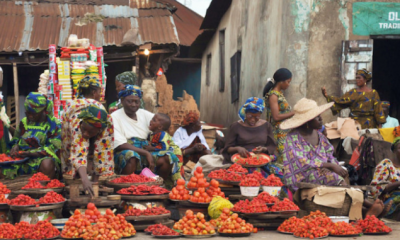By Hosea Parah, Abuja
Food inflation in Nigeria has surged to an alarming 40.66 percent in May, making it increasingly challenging for Nigerians to afford basic sustenance. The cost of food has risen by a staggering 61 percent from June 2023 to May 2024, underscoring the growing burden on the cost of living in the country.
These findings come from the latest analysis of the Consumer Price Index and Inflation report released by the National Bureau of Statistics. The Consumer Price Index measures the average change in the prices of goods and services consumed for day-to-day living.
According to the report, headline inflation rose by 0.26 percent to reach 33.95 percent in May, marking a 28-year high since March 1996. This surge in inflation can be attributed to the significant increase in food and transport prices.
Major contributors to headline inflation in May 2024 included food and non-alcoholic beverages (17.59 percent), housing, water, electricity, gas, and other fuels (5.68 percent), and clothing and footwear (2.60 percent).
A detailed breakdown of the data reveals a steady increase in the price of food commodities over the past year. From June to December 2023, the food inflation rate rose from 25.25 percent to 33.93 percent. In the following months, it continued to climb, reaching 35.41 percent in January, 37.92 percent in February, surpassing the 40 percent mark in March, and peaking at 40.66 percent in May.
The National Bureau of Statistics identified various food items that contributed to the year-on-year increase in food inflation. These included staples such as semovita, oatflake, yam flour, garri, beans, Irish potatoes, yams, water yams, palm oil, vegetable oil, stockfish, mudfish, crayfish, beef, chicken, pork, and bush meat.
Comparing May 2024 to the same period in the previous year, the food inflation rate rose by 15.84 percent points. The average annual rate of food inflation for the twelve months ending in May 2024 was 34.06 percent, recording a significant increase of 10.41 percent points from the average annual rate in May 2023 (23.65 percent).
Furthermore, Bauchi, Kogi, and Oyo emerged as the three most expensive states in Nigeria, experiencing the highest all-items inflation in May 2024. Bauchi recorded the highest inflation rate at 42.30 percent, followed by Kogi at 39.38 percent, and Oyo at 37.73 percent. Conversely, Borno, Benue, and Delta had the slowest rise in headline inflation on a year-on-year basis.
The continuous increase in food prices, along with other factors such as the removal of subsidies on petrol, has severely impacted the purchasing power of Nigerian citizens. Many households are struggling to afford daily meals, raising concerns about food security in the country.
Addressing this issue requires urgent action from the government, policymakers, and relevant stakeholders. It is essential to implement measures aimed at stabilizing food prices, supporting local agricultural production, and implementing social welfare programs to alleviate the burden on vulnerable populations.
As Nigeria continues to grapple with the mounting cost of living, efforts to ensure food affordability and security must be prioritized to safeguard the well-being of its citizens.

